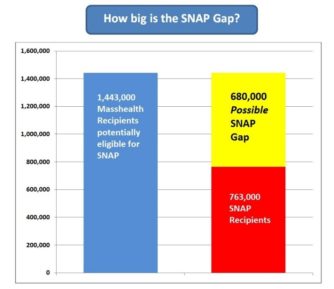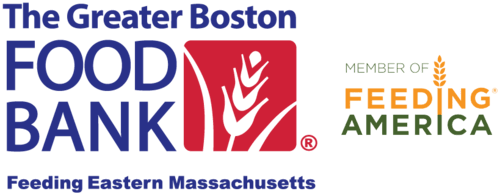Let’s Close the Massachusetts SNAP Gap
Let’s Close the Massachusetts SNAP Gap
One way The Greater Boston Food Bank (GBFB) helps people in need gain access to healthy food is through outreach and application assistance for the Supplemental Nutrition Assistance Program (SNAP, formerly known as food stamps).
GBFB recently helped Lillian, a disabled East Wareham woman on MassHealth, receive food through SNAP. Lillian was eligible for SNAP benefits, but wasn’t receiving them. There are an estimated 680,000 Massachusetts residents in a similar situation to Lillian—eligible for SNAP benefits, but not collecting them—who fall into what is called “the SNAP Gap.”
Closing the SNAP Gap is an important strategy for ending hunger across Eastern Massachusetts.
The Importance of SNAP
SNAP helps struggling families, seniors, and low-wage workers afford nutritious food and remain self-sufficient. On average, food insecure households in Massachusetts experience a shortfall in their weekly food budget of nearly $20 per person. SNAP benefits can help some households to fill that shortfall.
How is the SNAP Gap calculated?
The SNAP Gap is calculated by comparing the number of MassHealth recipients to the number of SNAP recipients in Massachusetts. Eighty percent of those receiving MassHealth are also likely eligible for SNAP. Therefore, the SNAP Gap represents the number of MassHealth recipients who are likely eligible for SNAP, but aren’t receiving benefits.

Graph 1: Massachusetts Law Reform Institute, http://www.masslegalservices.org/content/its-time-close-massachusetts-snap-gap
A Solution – Common Application
One solution for closing the SNAP Gap is a common application to let households apply for MassHealth and SNAP at the same time. This solution is currently under consideration in both houses of the Massachusetts Legislature.
Senate Bill 612 and House Bill 101 filed by Sen. Sal DiDomenico (D-Everett) and Rep. Jay Livingstone (D-Boston) would require the Executive Office of Health and Human Services (EOHHS), the state agency that oversees both programs, to create a plan for the common application by March 2018.
GBFB’s Advocacy
The Massachusetts State House has held two public hearings on this policy. Two GBFB team members attended the first hearing and submitted testimony for both hearings in support of the bill on behalf of the Food Bank Coalition of Massachusetts (which includes the four food banks of Massachusetts: GBFB, Merrimack Valley Food Bank, Worcester County Food Bank and The Food Bank of Western Massachusetts).
The testimony highlighted two stories of people who relied on GBFB’s member food pantries for most of their food. With their SNAP benefits, they gained a more consistent source of food and used their pantry less frequently.
Find the SNAP Gap numbers for your town here. Please contact your legislator today to ask him/her to support this important legislation.
